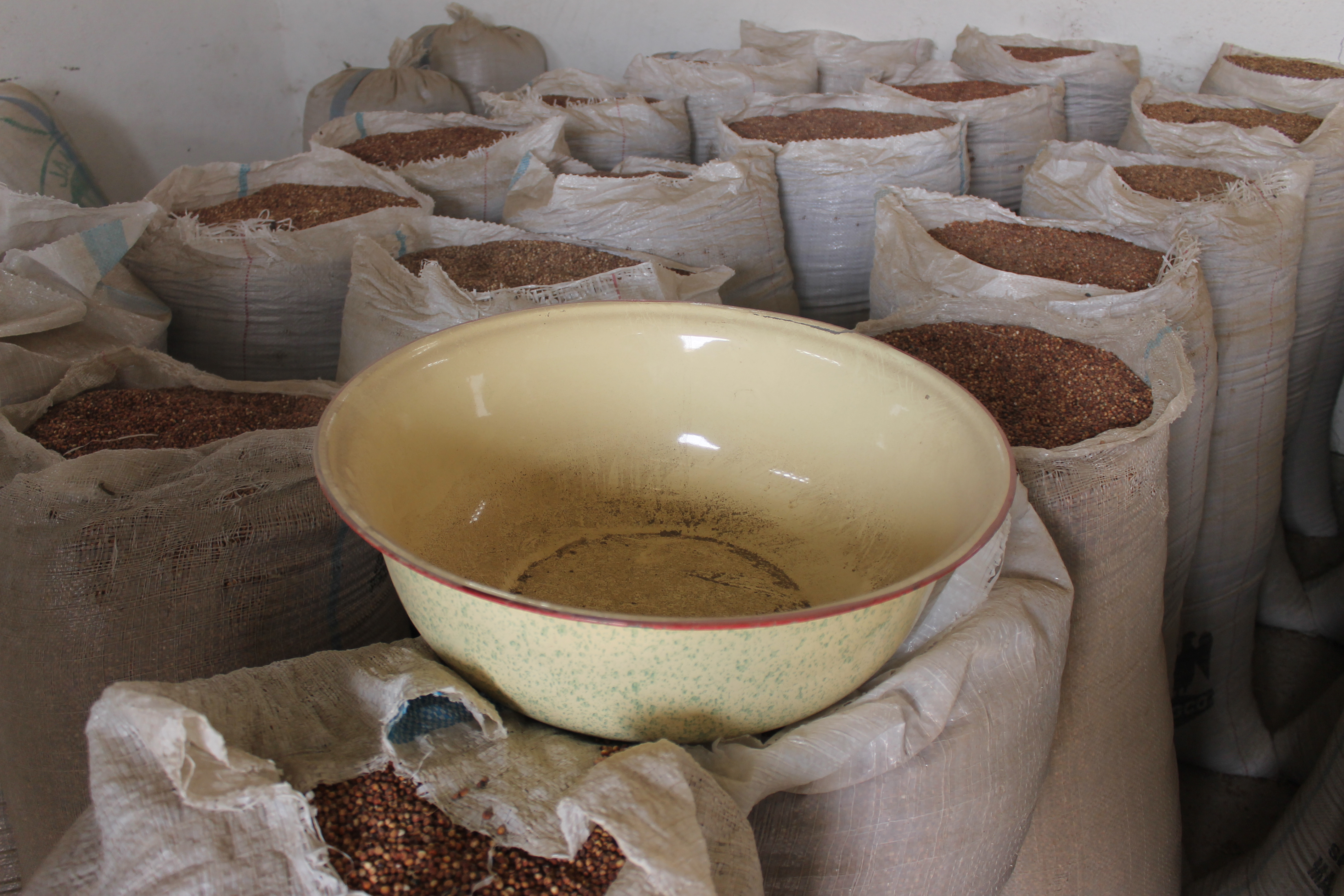By Jaff Napoleon Bamenjo, Coordinator, RELUFA, JH Cameroon

Bags of Sorghum collected for storing inside the community grain bank of the Betch-Hossere Village, which was started by RELUFA. Photo courtesy of Valery Nodem.
The Far North Region of Cameroon has been in the news lately due to attacks on villages by the terrorist group Boko Haram. Boko Haram recently murdered more than 100 people in the north Cameroon town of Fotokol. Villagers are consequently fleeing the violence, abandoning their homes and farms. According to the U.N. World Food Programme (WFP), 20,000 to 30,000 Cameroonians have been internally displaced due to the attacks, while more than 36,000 Nigerians have fled the insurgency in Nigeria and are now refugees in the Far North Region of Cameroon.
The Far North Region, already known for its high rate of food insecurity, is experiencing growing pressures on its food supply as the conflict continues to escalate and spill over from Nigeria into Cameroon. The region has been plagued in recent years by droughts (2009 and 2011) and floods (2010 and 2012) that have devastated crops and resulted in poor harvests. Cereal stocks have dramatically declined during this period, rendering the lean season, which runs generally from June to September each year, even leaner. The Cameroon Ministry of Agriculture estimates that there is currently a deficit of 100,000 tons of cereal in northern Cameroon, exposing nearly two million people to famine. In 2006, RELUFA, the Cameroonian Joining Hands network of the Presbyterian Hunger Program, started community grain banks (watch the video) in some villages in the Diamare and Mayo Tsanaga divisions of the Far North Region of Cameroon to address the food insecurity situation there. The grain banks permitted families to borrow grain during the lean period and reimburse the grain borrowed during the harvest period. Reimbursement is always accompanied by a small interest payment leading to increasing grain stocks in community grain banks that are well managed. Over the years, the program has expanded to 42 different villages and constructed 27 durable grain storage structures. RELUFA estimates that more than 25,000 people benefit, either directly or indirectly, from its community grain banks in the Diamare and Mayo Tsanaga divisions.
With the insurgency of Boko Haram, food production in the Far North Region of Cameroon has been negatively impacted, making reimbursement of cereals borrowed from grain banks difficult. In Ribidis and Wampa villages, families have not been able to reimburse the 36 bags of cereal borrowed during the lean period last year (2014). The inability to reimburse their community grain bank has left it empty. RELUFA’s data on the restocking of cereals in 2014 documents a deficit of 189 bags (18,900kg) of cereal incurred by 29 out of the 42 community grain banks. That’s enough cereal to feed 63 families (378 individuals) for 3 months.
If the current status of RELUFA’s community grain banks is any indication, the future appears bleak for the region as the Boko Haram attacks put community grain banks in jeopardy and aggravate further the food insecurity of families.
The Far North Region is shaping out to be a terrible humanitarian disaster as Boko Haram carries out violence and killings daily and people suffer from hunger, the silent killer. This is the time, more than ever before, to stand beside our brothers and sisters of northern Cameroon who are hungry and at risk of violent persecution and death. RELUFA and its partners will continue to work to support these brave people as they struggle for peace, harmony and food security.
![]() You may freely reuse and distribute this article in its entirety for non-commercial purposes in any medium. Please include author attribution, photography credits, and a link to the original article. This work is licensed under a Creative Commons Attribution-NonCommercial-NoDeratives 4.0 International License.
You may freely reuse and distribute this article in its entirety for non-commercial purposes in any medium. Please include author attribution, photography credits, and a link to the original article. This work is licensed under a Creative Commons Attribution-NonCommercial-NoDeratives 4.0 International License.